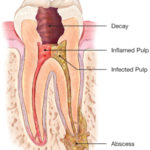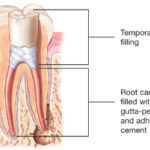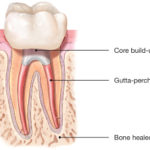Root canals are a result of dead or dying nerves inside a tooth. When the nerve starts to decay and die, it gives off gases. The tooth is a hard, enclosed tube inside and these gases have nowhere to go but to spill out the end of the tooth. This results in biting pain as the tooth is pushed up out of the socket and the patient bites on a higher tooth. The gases also act to strangle the remaining live tissue and this is VERY painful. This is actually one of the worst pains a person can experience. The pain is known to ebb and flow as the body tries to heal itself. We hear all the time that the tooth was sore and then got better so the patient thought everything was fine. However, it will always come back, we just cannot tell you when or where. Sometimes it returns as worse pain or even swelling of the gums or face, called an abscess. An abscess will result in loss of bone and possible loss of tooth as well.
Teeth know exactly the time your dentist’s office closes, or you are going on vacation because that always seems like the moment when the pain reoccurs.
If you have a sensitive tooth, please do not ignore it. It is always better to have it evaluated so we can avoid emergency appointments and pain for our patients.
Root canal therapy involves removing the center portion of the tooth to access and remove the nerve. Once the nerve chamber has been cleaned and sterilized, it is filled and sealed with a natural gum dammar called gutta percha. Root canals get a mean reputation because most stories patients remember are the bad ones and if waited until there is extreme pain or swelling, then it is very hard to get the patient numb. Not a comfortable experience for anyone involved.
After the root canal is completed, the center access hole is filled with composite (called a Build up) and a crown is recommended as soon as possible to avoid fracture and potential loss of the tooth. Root canals remove the vitality of the tooth, dry the tooth out like a skeleton and make the tooth very brittle and prone to fracture.
HOW TO SPOT A POSSIBLE ROOT CANAL TOOTH:
If you are having lingering pain to hot or cold for over 30 seconds, the tooth spontaneously starts to hurt (especially when laying down to sleep), the tooth becomes discolored, you are having persistent pain to chewing, or there is a swelling in your mouth, then you may be a root canal candidate. Please call to schedule an evaluation.









